In
the latest attack on Monday morning, a family of five rode two
motorcycles to the front gate of Surabaya's police headquarters before
detonating explosives, injuring 10 people.
On
Tuesday, police identified the couple as Tri Murtiono and his wife Tri
Ernawati, who carried out the attack accompanied by their sons, aged 18
and 14, and their 7-year-old daughter. CNN had previously reported that
the girl was eight, per police statements.
She
was riding as a passenger on one of the bikes and was thrown clear of
the explosion, police spokesman Frans Barung Mangera said. A video of
the scene showed her staggering through the rubble before a bystander
picked her up and carried her to safety.
The bombing came one day after a family of six, including four children, detonated explosives at three churches, killing 12 people and injuring at least 40.
The
father, identified by police as Dita Oepriarto, was said to have driven
his wife Puji Kuswat and their two daughters, aged 9 and 12, to the
Indonesian Christian Church. The trio went inside and detonated a bomb.
Oepriarto
then drove the van to the Pentecostal Central Church, where, from
inside the vehicle, he detonated another bomb, police said.
Around
the same time the couple's two teenage sons, aged 16 and 18, drove
motorcycles to the Santa Maria Catholic Church, where they also
detonated bombs. All members of the family died in the attacks, which
ISIS claimed responsibility for via its Amaq News Agency in what it
called "a martyrdom operation."
Later
Sunday, in what police also described as a terror incident, a mother
and her 17-year-old daughter were killed in the Surabaya suburb of
Sidoarjo when a bomb handled by the family's father detonated
prematurely. Police found the father of the family in a house holding a
detonator and shot him, police spokesman Barung Mangera said.
The family's 12-year-old son took his two younger sisters to the Bhayangkara Police Hospital, he added.
Tito
Karnavian, Indonesia's top-ranking police officer, told reporters
Monday that police were working on the assumption that the attacks
followed a directive from ISIS Central Command to avenge the
imprisonment of the former leaders of Jamaah Ansharut Daulah (JAD), an Indonesian jihadi group that supports ISIS.
Indonesia,
the world's most populous Muslim country, has struggled in recent
months with a rise in Islamist militancy, which has come as ISIS has
been squeezed out of its heartland in Syria and Iraq.
Karnavian
also told reporters Monday that none of the families involved in the
attacks had recently traveled to Syria, but Oepriarto had close links
with someone who had recently returned from Syria who may have inspired
him to carry out the attacks.
"These
attacks are the nightmare scenario that's been anticipated since
Indonesians affiliated with ISIS have returned from the Middle East,"
said Greg Barton, Chair in Global Islamic Politics at Deakin University
in Australia.
Families linked
In
an exclusive interview with CNN, Oepriarto's father said his son was
close friends with the man involved in the explosion in the suburb of
Sidoarjo on Sunday evening.
"He's
never spoken about it, but I know my son is close friends with Anton,"
Raden Doddy Oesodo said, referring to the man who died in the affordable
housing complex in Sidoarjo after a bomb detonated prematurely.
"Anton
was my son's buddy in high school. Anton is my son's junior within the
JAD organization. My son, his wife and Anton were part of the same JAD
membership," he said, adding that his son was introduced to JAD in high
school.
Oesodo
described Oepriarto as "reclusive" and "private," but said he never
spoke about martyrdom or traveling to Syria. "I've never heard him talk
about jihad, but my son often disagrees with government policies."
Sitting
in his home, Oesodo held a family photo of Oepriarto and his three
other children and spoke about his love for his family.
"I love my grandchildren very much. They died because of their father's ideology," Oesodo said.
"I
want to apologize to Surabaya residents who have become a victim due to
my son's actions. I apologize from deep within my heart, especially to
those who died because of him."
'Opening salvo'
Formed
in 2015, the group linked to the attacks, Jamaah Ansharut Daulah (JAD),
is a jihadi group that supports ISIS, according to Jakarta officials.
Its
leader, Aman Abdurrahman, was scheduled to appear at a court hearing
last week, but it was postponed after a deadly riot broke out at the
jail where Aman is being held in Depok, West Java, according to a report
in the Jakarta Post.
Police now
believe the riot at the Mobile Brigade Detention Center was initiated by
a convict acting on the ISIS Central Command's instruction.
The
militant group is part of a "second wave" of terrorist groups to be
active in Indonesia, according to Hugo Brennan, senior Asia analyst at
Verisk Maplecroft, a risk consultancy firm.
"The
first wave was linked Al Qaeda from 2001 and were involved in the Bali
attacks. Indonesian security forces dealt with them fairly effectively.
"Then
in 2014 there was an uptick in violence as groups linked to ISIS became
active, stoked by online propaganda, militants who traveled to the
Middle East and fighting in the Philippines. The attacks yesterday are
part of a pattern ... but (are among) the more sophisticated, and as it
involved children, heinous."
Barton
at Deakin University said the Surabaya attacks could be the "opening
salvo of a new, more sophisticated campaign," and added that the timing
-- just before Ramadan, which begins May 15 -- "bears the hallmarks of
ISIS," which has used the holy month in the past to launch high profile
attacks.
"This is the first Ramadan since ISIS-linked Indonesians have returned" from Syria, he said.
Indonesia
has a long history with terrorist groups, particularly the al-Qaeda
affiliated group Jemaah Islamiyah, which claimed responsibility for 11
attacks between 2000 and 2010, including the deadly 2002 Bali bombings
that left more than 200 people dead and hundreds injured, many of them
tourists.
According to Wawan
Purwanto, the information and communication direct of Indonesia's
National Intelligence Agency, around 930 Indonesians have traveled to
Syria and Iraq to fight alongside ISIS since 2013.
Of
those, around 400 had returned to Indonesia while 100 are known to have
died in battle. Exact numbers are uncertain because immigration
officials in Iraq and Syria don't have a record of them entering those
countries, Wawan said.
The
United Nations Secretary-General condemned the three terrorist attacks
on the Surabaya churches. Through his spokesman, Stephane Dujarric,
Secreatry General Antonio Guterres said that he was "appalled at reports
that children were used to participate in the attacks," and offered his
condolences to the families of the victims.
"(The
Secretary General) reiterates the support of the United Nations to the
Government and people of Indonesia in their efforts to fight and prevent
terrorism and violent extremism, including through the promotion of
pluralism, moderation and tolerance," the statement said.
More than 82% of Indonesia's roughly 261 million people follow Islam. Almost 10% of the population is Christian.
Correction:
The name of the father in the church suicide bombings has been updated
following further information from police. His name is Dita Oepriarto.
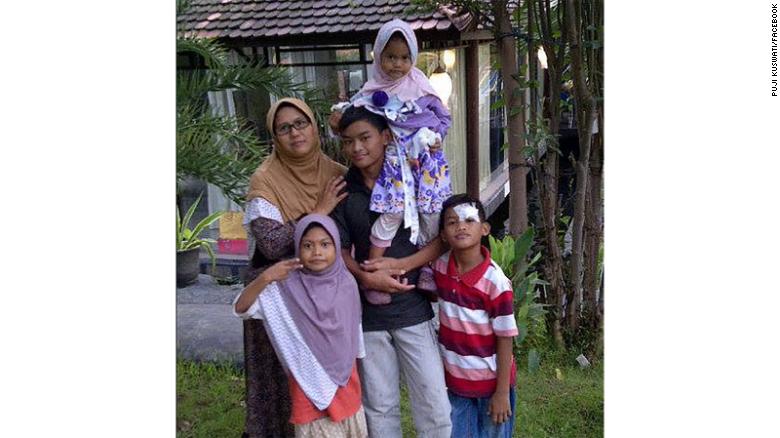
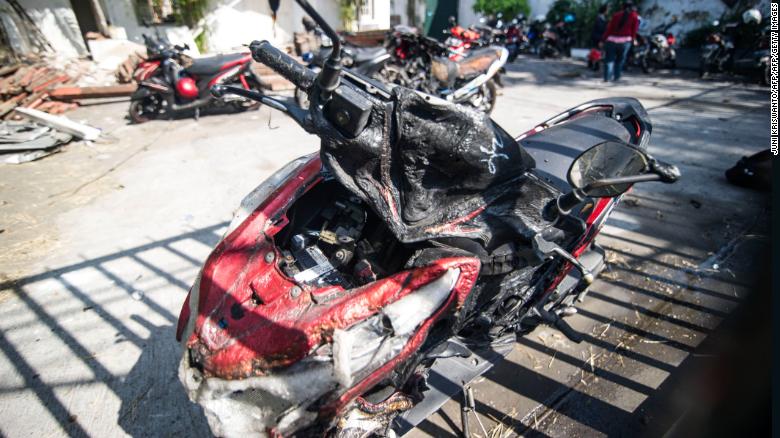
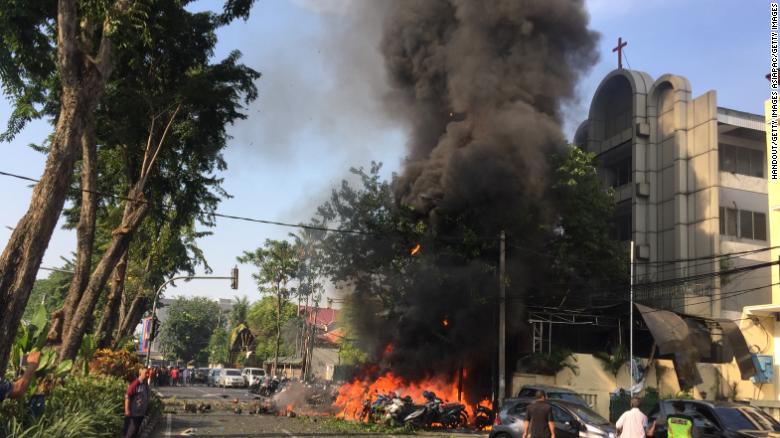
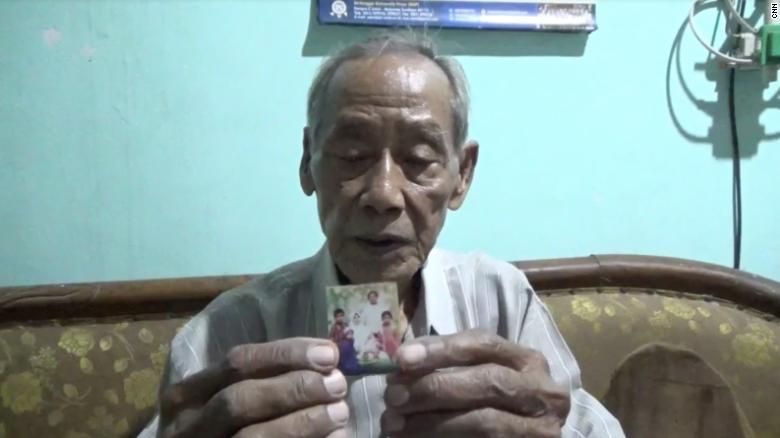
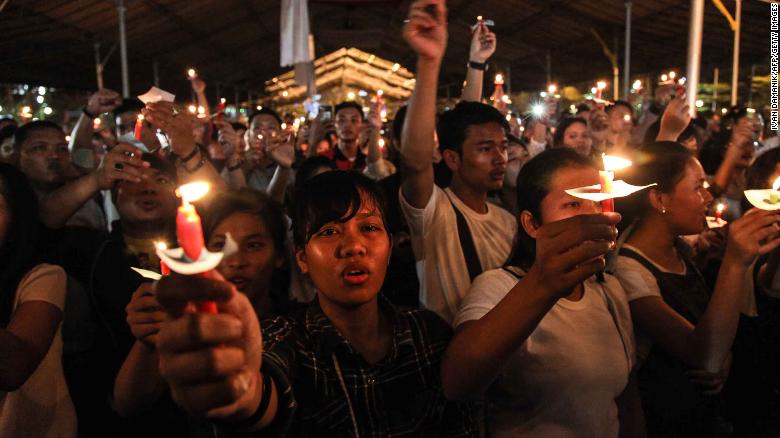
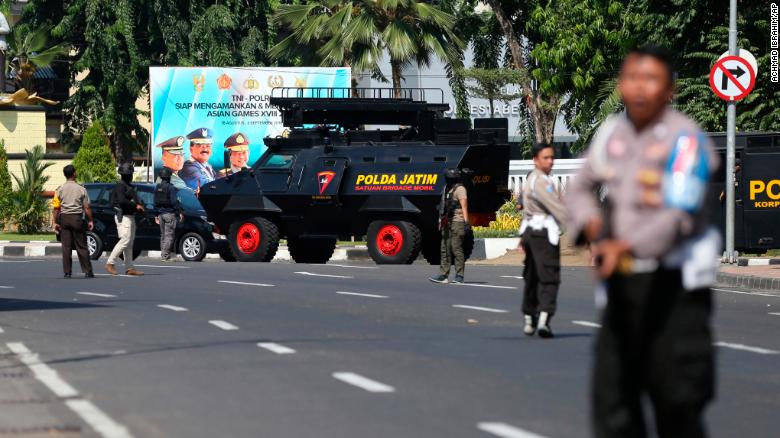
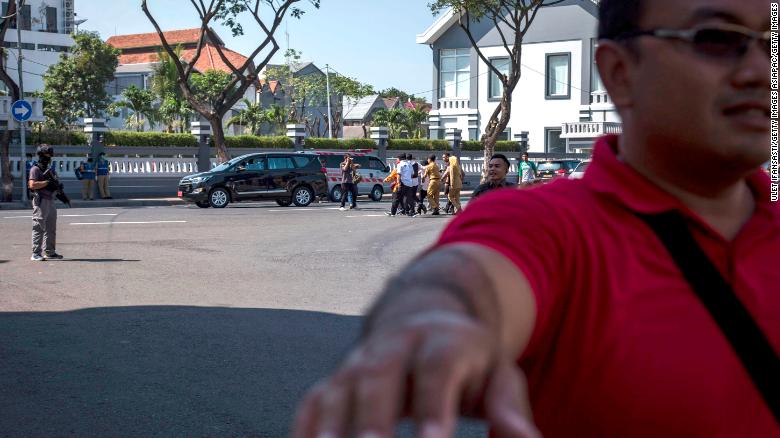





No comments:
Post a Comment